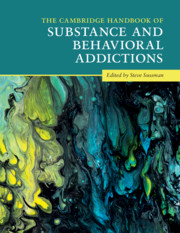Book contents
- The Cambridge Handbook of Substance and Behavioral Addictions
- The Cambridge Handbook of Substance and Behavioral Addictions
- Copyright page
- Contents
- Figures
- Tables
- Contributors
- Foreword
- Preface
- Acknowledgements
- Part I Concepts of Addiction
- Part II Clinical and Research Methods in the Addictions
- Part III Levels of Analysis and Etiology
- Part IV Prevention and Treatment
- Part V Ongoing and Future Research Directions
- 24 Precision Behavioral Management (PBM): A Novel Genetically Guided Therapy to Combat Reward Deficiency Syndrome (RDS) Relevant to the Opiate Crisis
- 25 Novel Psychoactive Substances: A New Challenge for Prevention and Treatment
- 26 Impaired Physicians
- 27 Feedback Models for Gambling Control: The Use and Efficacy of Online Responsible Gambling Tools
- 28 Food versus Eating Addictions
- 29 Measurement, Prevention, and Treatment of Exercise Addiction
- 30 Tanning as an Addiction: The State of the Research and Implications for Intervention
- 31 Considering the Overlap and Nonoverlap of Compulsivity, Impulsivity, and Addiction
- 32 Anhedonia in Addictive Behaviors
- 33 Mindfulness-Based Interventions Applied to Addiction Treatments
- 34 American Legal Issues in Addiction Treatment and Research
- Index
- References
27 - Feedback Models for Gambling Control: The Use and Efficacy of Online Responsible Gambling Tools
from Part V - Ongoing and Future Research Directions
Published online by Cambridge University Press: 13 July 2020
- The Cambridge Handbook of Substance and Behavioral Addictions
- The Cambridge Handbook of Substance and Behavioral Addictions
- Copyright page
- Contents
- Figures
- Tables
- Contributors
- Foreword
- Preface
- Acknowledgements
- Part I Concepts of Addiction
- Part II Clinical and Research Methods in the Addictions
- Part III Levels of Analysis and Etiology
- Part IV Prevention and Treatment
- Part V Ongoing and Future Research Directions
- 24 Precision Behavioral Management (PBM): A Novel Genetically Guided Therapy to Combat Reward Deficiency Syndrome (RDS) Relevant to the Opiate Crisis
- 25 Novel Psychoactive Substances: A New Challenge for Prevention and Treatment
- 26 Impaired Physicians
- 27 Feedback Models for Gambling Control: The Use and Efficacy of Online Responsible Gambling Tools
- 28 Food versus Eating Addictions
- 29 Measurement, Prevention, and Treatment of Exercise Addiction
- 30 Tanning as an Addiction: The State of the Research and Implications for Intervention
- 31 Considering the Overlap and Nonoverlap of Compulsivity, Impulsivity, and Addiction
- 32 Anhedonia in Addictive Behaviors
- 33 Mindfulness-Based Interventions Applied to Addiction Treatments
- 34 American Legal Issues in Addiction Treatment and Research
- Index
- References
Summary
Social responsibility in gambling has become a major issue for the gaming industry. This has been coupled with the rise of behavioural tracking technologies that allow companies to track every behavioural decision and action made by gamblers on online gambling sites, slot machines, and/or any type of gambling that utilizes player cards. This chapter has a number of distinct but related aims including: (a) a brief overview of behavioral tracking technologies accompanied by a critique of both advantages and disadvantages of such technologies for both the gaming industry and researchers; and (b) results from a series of studies completed using behavioral tracking data to evaluate the efficacy of online responsible gambling tools (particularly in relation to data concerning the use of social responsibility tools such as limit setting, pop-up messaging, and personalized feedback to gamblers).
- Type
- Chapter
- Information
- The Cambridge Handbook of Substance and Behavioral Addictions , pp. 333 - 339Publisher: Cambridge University PressPrint publication year: 2020
References
- 43
- Cited by



